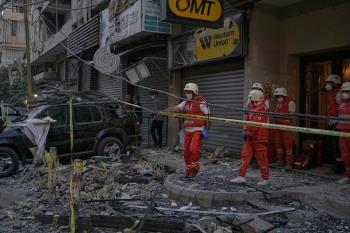Alwaght- Russian relations with the US and Britain are at an all-time low months after Donald Trump's swearing-in as US president.
Greeting the election of American real estate mogul in November warmly, Moscow was optimistic that Donald Trump will thaw Russian chilly relations with the US and its European allies.
Yet decisions by Mr Trump since coming into office have seen the two nations come into conflict, suggesting that Russia-US differences are so substantive and deep-rooted that cannot be solved by persons, even if they be the leaders.
Syria Crisis
The US President vowed to improve ties with Russia and suggested he may lift the sanctions on Moscow has recently said that US relations with Russia are at "an all-time low" over the Syria crisis.
The American Business tycoon, who in his pre-election promises has vowed to destroy ISIS rather that Syrian government, has ordered a missile strike against a Syrian airbase from where government forces were launching airstrikes against ISIS terrorists.
Russia condemned the US strike as a violation of international law and suspended a hotline between the two country’s militaries in Syria in protest at the strike.
After US attack on Syria, Mr. Putin expressed barely disguised frustration with Mr Trump, saying relations between Russia and the US had actually deteriorated since the new president was sworn in.
"It can be said that the level of trust at the working level, especially at the military level, has not become better but most likely has degraded," Mr Putin said in an interview broadcast by state television channel Mir.
The Russian foreign ministry also issued a statement saying "It's clear Russian-US relations have never been so difficult since end of Cold War".
Korean Peninsula Tensions
The ministry said it was concerned about many aspects of US foreign policy, including on Libya, Yemen and Syria, but said it was particularly concerned about North Korea. "We are really worried about what Washington has in mind for North Korea after it hinted at the possibility of a unilateral military scenario. "It's important to understand how that would tally with collective obligations on de-nuclearising the Korean peninsula, something that is underpinned in UN Security Council resolutions."
Russia has warned the US not to take any unilateral military action against North Korea like it did on Syria.
Russian Foreign Minister Sergei Lavrov issued the stern warning on Monday while reacting to US Vice President Michael Pence’s recent statement on North Korea, in which he said that "the era of strategic patience is over." Lavrov noted that "if the US vice president meant that Washington could unilaterally use military force, then it is a risky road."
"I can’t say that Obama’s presidency was an era of strategic patience because the United States took quite tough steps against North Korea in order to hamper the development of industries important for missile and nuclear programs," the Russian foreign minister noted. "But the UN Security Council also imposed rather severe sanctions and on many occasions condemned Pyongyang’s activities."
Lavrov went on to say that "we find Pyongyang’s adventurous missile launches unacceptable as they are a violation of the UN Security Council’s resolutions."
"But that does not mean that others can violate international law in response and use military force," the Russian top diplomat stressed. "I hope that there will be no more unilateral actions like the one we have recently seen in Syria while the United States will pursue the course which President (Donald) Trump has announced during his election campaign," Lavrov added.
Michael Pence said earlier that "all options are on the table to achieve the objectives and ensure the stability of the people" of North Korea. "There was a period of strategic patience but the era of strategic patience is over," he added.
Tensions on the Korean Peninsula are reaching boiling point again, after Pyongyang conducted a missile test amid joint US-South Korea drills in March. On April 10, the USS Carl Vinson was part of a strike group that reportedly headed to the peninsula as a show of force and to demonstrate readiness for “various scenarios.”
Russian state TV: Trump more dangerous than N Korea's leader
News presenter Dmitry Kiselyov said on his weekly TV news show 'Vesti Nedeli': “The world is a hair's breadth from nuclear war."
"War can break out as a result of confrontation between two personalities: Donald Trump and Kim Jong-un. Both are dangerous, but who is more dangerous? Trump is."
Mr Kiselyov also said Mr Trump was “more impulsive and unpredictable” than the North Korean leader. He added that both men shared the characteristics of having “limited international experience, unpredictability, and a readiness to go to war".
"He (Kim Jong-un) is after all on his home territory. He doesn't plan to attack anyone just for the sake of it,” said Mr Kiselyov, who once said.
Mr Kiselyov sarcastically told viewers that the North Korean leader's young daughter did not, unlike Ivanka Trump, have an office in her father's official residence.
A survey by state pollster VTsIOM showed on Monday that the percentage of Russians who hold a negative view of Trump has jumped to 39 from seven per cent in a month, and that feelings of distrust and disappointment towards him have grown too.
Afghanistan
Russia and the US are at odds over Afghanistan with Washington accusing Moscow of "providing political legitimacy -- and maybe even supplies -- to the Taliban in Afghanistan" in a bid to undermin the US and NATO.
"It is my view that they are trying to increase their influence in this critical part of the globe," Gen. Joseph Votel, who oversees US forces in the region, told the Senate Armed Services Committee earlier this month.
"Military commanders and analysts see Moscow's efforts as aimed at taking advantage of the geopolitical turbulence in the Middle East to re-establish Russia as a major player in the region and by extension the world stage," CNN reported.
It seems that Moscow is frustrated with Washington's inability to bring peace and stability to Afghanistan 16 years after the US-led offensive on Afghanistan to allegedly eliminate Taliban and al-Qaeda.
Russia has three main objectives in Afghanistan. One is to see a stable friendly Afghanistan, as it is concerned about threats from extremist groups arising from the war-torn country.
Another Russian objective is to limit the growth of the narcotics trade from Afghanistan, the largest producer of heroin in the world, to Central Asia and Russia. The latter accounts for 20 percent of the $70bn opiate market, with around 1.8 million injecting drug users in 2015. Around 90,000 Russians die from drug overdose, including heroin, every year
The third objective is to expand Russian influence in the face of the declining US military involvement in Afghanistan, especially from the end of 2014 when the US and its allies withdrew most of their troops from the country.
Crimea
Obama's administration has repeatedly accused Russia of implementing a policy of repression on the Crimean peninsula and called for the occupation to end. It seems that the US new administration is also following his suit.
UN Ambassador Nikki Haley gave a fiery speech at the UN Security Council condemning Russia’s annexation of Crimea, vowing that “our Crimea-related sanctions will remain in place until Russia returns control over the peninsula to Ukraine."
US State Department spokesperson Mark Toner called on Russia to end occupation of the Crimean Peninsula.
"We call on Russia to cease its attempts to suppress freedom of expression, peaceful assembly, association and religion," Toner said in an official statement, which accused Moscow of extrajudicial killings, enforced disappearances and repression on the peninsula.
"The United States again condemns the Russian occupation of Crimea and calls for its immediate end. Our Crimea-related sanctions will remain in place until Russia returns control of the peninsula to Ukraine," he added.
Russia-UK strained relations
Russia's ties with US closet ally, the UK, are also at lowest ebb since cold war.
British-Russian relations are at an all-time low, Moscow’s ambassador to the UK said, refuting London's claim that Moscow is on the "wrong side" of the Syrian argument. He also slammed Britain's decision to deploy troops to the Estonian border.
Responding to British Prime Minister Theresa May's claim that Russia is on the “wrong side of the argument” when it comes to Syria, Ambassador Alexander Yakovenko said “the opposite is true.”
UK-Russia relations crisis deepened when British foreign secretary Boris Johnson branded Russian President Vladimir Putin a “super-villain” for his support for Syria.



























